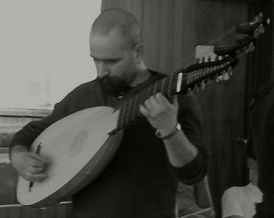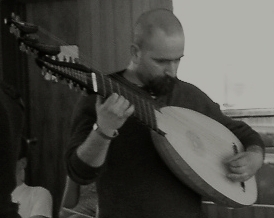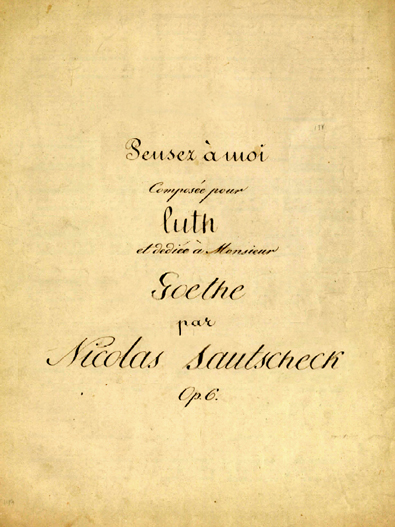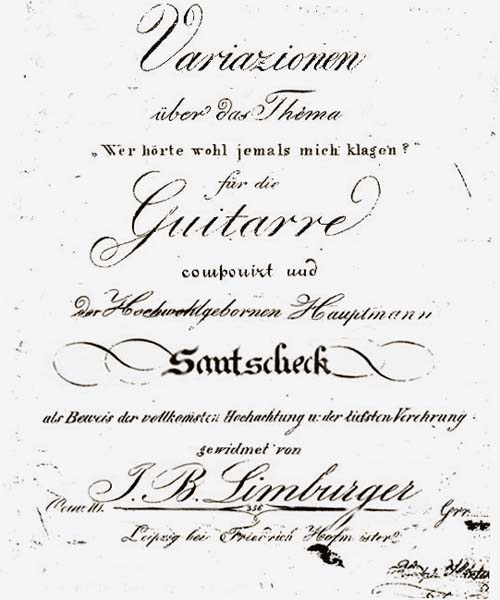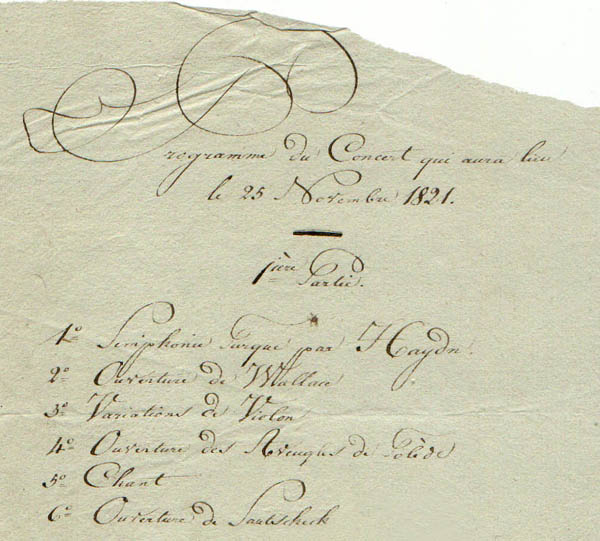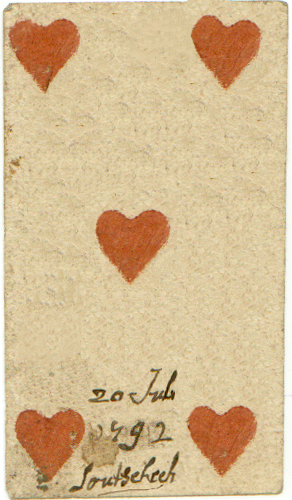The Sautscheck Family Saga
An experiment in paramusicology...
Last uptate: February 1, 2005
These pages purport to shed light on 4 generations of a particular (if somewhat peculiar) family of composers who dedicated their efforts of cosiderable consistent musical quality to the 13-course Baroque Lute in the course of 200 years that followed 30-year War and the ill-fated Russian Campaign of the Swedish King Carl XII (aka The Great Northern War), all the way up to a the year 1848.
Their variously spelled surname was SAUTSCHECK, a surname obviously of Bohemian origin, rather comical to modern German ears [although some bearers of this name still live in Germany]. The Name in all likelyhood is cognate with the Slavic root meaning Hare in English or Hase in German ans was not uncommon in Sudetenland. It is likely to be related to Czech surname Souc^ek.
Some time around 1848, Konradin Aemilius Sautscheck prepared a large manuscript of Music in Baroque Lute Tabulature by all his ancestors, including his own works, as well as some works of other composers that were written FOR the members of the family. This collection was entitled "Musicalische Abendprüfungen". It is the source of all musical examples found on these pages.
There is limited information available on the family: What we know is that at the close of XVII-th century Georg-Anton S. who seems to have been born to a Jewish family either in Stary Benatek or Upice in Bohemia. He converted to Moravian Protestantism (which was not an expeditious thing in the political climat of the era) and married Katharina Dorothea Küchelbekker of a destitute baronial family that at that time had only good education left in its posession. Their marriage contract (signed by local priest Frantisek Turovsky) survives. GA was a paper manufacturer, and she supported her family giving music and Italian lessons to the children of local nobility, until the family fortune improved and they enjoyed a modicum of relative prosperity. They also had a connection to the Benda family, GA stood as godfather to one of the Benda boys who became a famous composer later. "Benda" which derives from Ben-David had similar Jewish roots.Georg Anton Sautscheck was the family lute-playing partiarch. Only a handful of pieces, a SARAVANDA and a few TOMBEAUX are extant from his pen.Johann Joachim Sautscheck: (a son of GAS) performed diplomatic duties for some courts in North and Central Germany in addition to tending the family's paper manufacture]. He married Caroline Boehmer, a daughter of a member of C.P.E.Bach's circle of friends in Berlin. He was the most prolific of all the Sautschecks, working primarily in the genre of Suite..
Caroline Boehmer-Von Sautscheck, wife (?) of Johann Joachim. There is no tangible proof that she was a musician herself, but the fact that she was commemorated by a lute/clavichord piece "La Caroline" by C.P.E.Bach raises a possibility that she was one.
Joachim Peter Sautscheck was commemorated in a likewise fashion by C.P.E.Bach by a clavichord/lute piece "La Sautscheck". See "OPUS" page for the musical examples by all members of the family as well as their friends-contemporaries.
Joachim Peter Sautscheck. His grandson. The most cosmopolitan of the Sautschecks, his preferred form was the Sonata.
Gotthold Ephraim Sautscheck, the twin brother of Joachim Peter. There is considerable confusion as to ascription of tabulatures penned by the 2 of them.
Konradin Aemilius Sautscheck (a son to Joachim Peter S.) who lived at least until 1848. The first Sautscheck to choose the profession of Artist-Painter, although he composed as well. There are some compositions of his that are still extant. He also played TORBAN.
Nicolas (von) Sautscheck was a military man who was also active as a musician in the Limburg area of the Netherlands. None of his music has survived, but there are some documents pertaining to his activities as a composer that are preserved in an archive in Maastricht (see below). The degree of relation of Nicolas to the Family has not been determined, but the connection is not in doubt, given the rarity of the surname.
Forkel recounts the following anecdote from the life of Johann Joachim:"Lorenz [Mizler] once told me that Sautscheck made no secret [which earned him few friends] of his dislike of all sopranos. One evening he was dining in his usual fashion (that is, whenever he has in Dresden) at a certain coffeehouse with his bosom friends Weiss, Zelenka and Friedemann Bach, having a conversation exeedingly deep in matters philosophical which was accompanied by copious amounts of a certain Italian schnapps called Grappa di Brunello that Herr Sautscheck brought back from his journey to the Venetian territories. Meanwhile the neighbouring table was being occupied by none other than Hasse and Faustina accompanied by some fancy Frenchmen. Hasse, whose sugary music could not conceal his poisonous character, exacerbated by Sautscheck's opinion of Faustina, observed loudly that these grim "les artistes bent on minor keys" were not fit to live with pigs. To which Herr Sautscheck retorted that maybe they were not, but Herr Hasse surely was. All the diners present could not hold their laughter, which prompted the Hasse party to dine elsewhere..."
This obvously put Silvius Leopold Weiss (trapped between his artistic sensibilities and his professional loyalties in a "ketman" type of situation) in a serious embarrassement.
In the succeeding generations Joachim Peter S. and his son Konradin continued the family's devotion to composition for 13-course Baroque Lute well into the mid-XIX-th century.
Joachim Peter Sautscheck spent several memorable years in Ukraine, as a Professor of Music at the Kievo-Moghylajnska Akademija, the first University in the Eastern Europe and one the most progressive schools of the period, which maintained some unusual contacts with Western thought, through several visiting Lutheran theologians who had taught there in the course of the XVIII-th century.
Several Ukrainian folk melodies intabulated by JPS and KAS constitute the only lutenistic presence documented in Ukraine until 1970's, when several 16th century intabulations of Ukrainian folk songs by Ioannes Leopolita came to light. Leopolita was not a blood relative of the Sautscheck family, but his tabulatures were in the so-called Altsautschecks Archiv.
Several of the Sautschecks have played TORBAN, a type of THEORBO common in Ukraine from the end of 17th century to 1920 [see picture]. This unique type of Lute requires a special discussion.
See the pages at this TORBAN link.
Toward the end of the XIX-th century the family proclivities shifted permanently to the Art of Painting. These [and other] developements are covered HERE.
The only archival evidence of the musical activities of the Sautschecks (from the early 19th century) is preserved in a private collection in Maastricht, Netherlands. During 2004 several documents pertaining to Nicolas Sautscheck, a musician-lutenist and a military officer, were found in Limburg area of Belgium and the Netherlands (no family member had been previously known to have had been active in the area). Here are the images of 4 such documents (USED BY PERMISSION):
1.
2.
3.
4.
There is also an anonymous anecdote, that says that ":
".....exactly a week after Fux's affair an opera buffa was produced and
staged in Prague, in an enclosed garden adjacent to an beer establishment "U
Sauçeka".
It was called appropriately "Carezza di Brutezza e Clemenza di Cozze, ossia
Incertezza delle zizze della moglie di Besozzi".
It started with an Ouverture by Her Weiss for 2 lutes in imitation of
Heinichen with so many notes marching in place that it must
have really resembled the inside inside of the Pandora's 'box'......
Then Herr Tuma sang to his own accompaniment a Conti styled
aria "Nella foresta delle tiorbe...." with the words "la mia e' piu'
lunga" in VERY long notes over a scurrying bass.
Then Herrn Quantz, alternating with voice and flute, Gebel
and Graun on lutes played and sang an aria containing no themes but lots of
sequences of a martial nature alla Hasse to the unfortunate words"Dall'inganno
del spompinarmi,.... il re vuole incularmi, all'armi, all'armi etc."
with such a cunning imitation of Faustina that poor Zelenka
dropped his bow, tore off his wig [though he was a man of Gravitas] and almost
choked. Then he cried:
"You are having fun, bastards, but 'tis I being "@$%^ed every day of my
life in that wretched place..."
Herr Sautscheck who contributed the libretto played a few
licks on lute here and there, "in echo". Someone I dare not mention kept
watch at the door as this might not have sat well with the Emperor, if that
ever touched upon his ears, and that certainly would have resulted in exile
to Upice for 10 years at the least...."......
> The rest of the account fell prey to 1945 water damage, as it
> was mixed in
> with von Dittersdorff's scores. Contemporary beer damage also could have been
> responsible.
>
